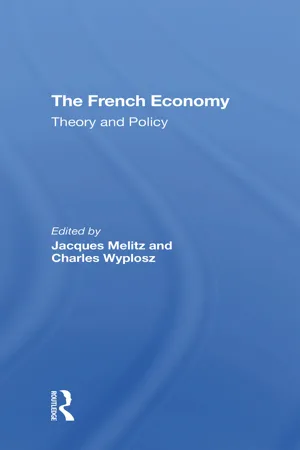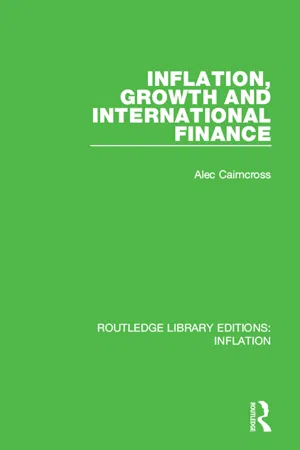Capital Controls
Capital controls refer to measures taken by a government or central bank to regulate the flow of capital in and out of a country. These measures can include restrictions on foreign investment, limits on the amount of currency that can be exchanged, and regulations on the repatriation of profits. The goal of capital controls is often to stabilize the country's currency and protect its financial system.
3 Key excerpts on "Capital Controls"
- eBook - ePub
Banking Crises
Perspectives from the New Palgrave Dictionary of Economics
- Garett Jones, Garett Jones(Authors)
- 2016(Publication Date)
- Palgrave Macmillan(Publisher)
...Capital Controls Capital Controls are any restrictions on the movement of capital into or out of a country. Capital Controls can take a wide variety of forms. For example, Capital Controls can be quantity-based or price-based, or apply to only capital inflows, only capital outflows, or all types of capital flows. Capital Controls can also be directed at different types of capital flows (such as at bank loans, foreign direct investment or portfolio investment) or at different types of actors (such as at companies, banks, governments or individuals). Most developed countries believe that the benefits from the free movement of capital across borders outweigh the costs, and therefore have very limited (if any) Capital Controls in place today. For emerging markets and developing economies, however, there has been a long-standing debate on the desirability of Capital Controls. Assessing the impact of Capital Controls is complicated due to a number of factors, including the various forms in which they can be structured. This article discusses the recent debate on Capital Controls, focusing on the theoretical arguments for and against controls and the existing empirical evidence on their impact. History of the debate Throughout the 20th century, economists have regularly expressed concerns about international capital flows. For example, in the 1940s Ragnar Nurkse worried about ‘destabilizing capital flows’ and in the 1970s Charles Kindleberger described the role of capital in driving ‘manias, panics and crashes’ (see Nurkse, 1944; Kindleberger, 1978). When the world’s leading economies met at Bretton Woods in 1944 to formulate rules governing the international financial system, John Maynard Keynes and other delegates debated the role of Capital Controls...
- eBook - ePub
The French Economy
Theory And Policy
- Jacques Melitz, Charles Wyplosz(Authors)
- 2022(Publication Date)
- Routledge(Publisher)
...Because a “wrong” exchange rate will ultimately need to be ajusted, controls may, at best, delay this outcome. But, in the meantime, it essentially benefits those who are in a position to speculate and who can take advantage of the usual one-sidedness of such operations. Furthermore, capital restrictions on transactions, by residents are often riddled with loopholes and fail to prevent non-residents from exerting a powerful pressure on the parity. Yet, it is a fact that, permanently or temporarily, almost all countries have used some Capital Controls, even those countries known for their adherence to free markets 1. Although the widespread existence of Capital Controls is certainly not a proof of their usefulness, it would indicate that the question requires investigation. The literature is too thin to warrant any definitive statement, and as we will show, the few references that we have found take a cautious stand. 1. The outstanding exception seems to be Lebanon. Although Germany, Switzerland, the UK and US are now free from such restrictions, they have enforced some of them in the recent past Countries like France, Italy, Belgium, Japan have more or less always used some forms of controls and the LDC'a (with some exceptions as Mexico until August 1982), with limited capital markets, often dominated by the monetary authorities, usually control directly all capital movements and also, sometimes, the trade flows. In this paper, a very tentative inquiry into a topic which is not amenable to simple statements, we pursue two objectives. First, we try to outline which arguments could be made in favor of Capital Controls, drawing on the existing literature. In section 1, we consider the long-run aspects of these controls, outlining four arguments which may sometimes justify imposing restrictions on capital movements, at least from a nationalistic point of view...
- eBook - ePub
- Alec Cairncross(Author)
- 2016(Publication Date)
- Routledge(Publisher)
...The future of Capital Controls must therefore depend to some extent on the system of economic management in vogue. The system of economic management is unlikely to be simply a matter of political ideology and must reflect to some extent what has been found to work in practice. There may, for example, be a strong aversion to floating rates in countries with large external liabilities uncovered by exchange guarantees. Or experience may suggest that the balance on current account would respond feebly or perversely to depreciation of the exchange rate. Alternatively, countries may be unwilling to run the risk of a deterioration in their terms of trade in an effort to bring their current surplus into line with a larger capital outflow. In these circumstances Capital Controls would find some justification in helping either to stabilise the exchange rate or to avoid less favourable terms of trade. The choice which a country makes also depends on the international regime in respect of trade and payments within which it operates. This is partly a matter of following the prevailing fashion and partly of obeying the rules of the game, either out of regard for the common interest or because it does not pay to break them. If other countries are floating, it is impossible to have a fixed rate. If other countries have Capital Controls it becomes harder to avoid introducing them. A country which, left to itself, might prefer to let its exchange rate float may be less than happy when everyone else floats too and may be willing to enter into an international agreement to limit floating even if this obliges it to contemplate the imposition of Capital Controls. In a sense, this is the proposition that was put by the British to the American Government in the discussions leading up to Bretton Woods. But there is also, and perhaps more importantly, the question of effectiveness...


